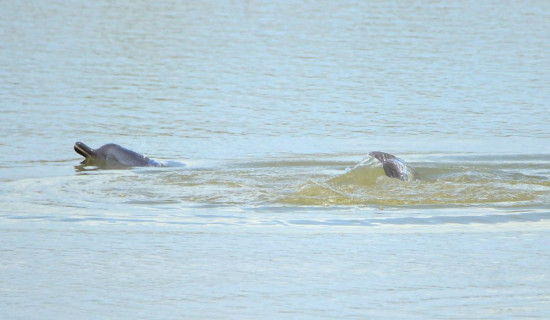- Monday, 25 August 2025
We need Rs. 15 billion extra to buy fertilisers: Minister
By A Staff Reporter,Kathmandu, Aug. 15: Minister for Agriculture and Livestock Development Ramnath Adhikari has claimed that there has been a significant improvement in the supply of chemical fertilisers.
Informing about the status of supply and distribution of chemical fertilisers distributed under subsidy in the House of Representatives on Thursday, Minister Adhikari admitted that despite tireless efforts, maximum amount of subsidy fertilisers could not be supplied to all crops in all seasons as per the demands of the farmers. However, he said that as much fertiliser as could be brought from the budget received by the ministry has been brought and distributed.
Minister Adhikari stressed the need to increase the budget allocation for subsidy in chemical fertilisers as it is not possible to provide fertiliser as per the demand from the current budget allocation. He said that a total of 491,000 tonnes of fertilisers imported last fiscal year, which is the highest ever.
Minister Adhikari also informed the parliament that the ministry needs an additional budget of Rs. 15 billion as Rs. 44 billion is required for the supply of 600,000 tonnes of fertiliser as announced in the current fiscal year's budget speech.
He said that at the current price, only around 360,000 tonnes of fertiliser can be purchased from the budget allocated for the current fiscal year of Rs. 28.82 billion.
Minister Adhikari said that the main problem in fertiliser management seen at present is not being able to supply as per the demand.
The ministry currently projects that the annual demand for fertilisers is about 1.3 million tonnes.
Stating that almost all of the fertiliser subsidy budget received by the ministry (Rs. 27.36 billion) has been spent for the first time, Minister Adhikari said that a tender for 300,000 tonnes has been issued from the current fiscal year budget after obtaining source approval from the Ministry of Finance last year.
Although the supply of DAP and potash fertilisers is currently good, there are some problems in the supply of urea, he said.
Minister Adhikari said that the current fertiliser problem is due to the increase in the prices of fertilisers in the international market and the slow loading of fertiliser at the Kolkata Port, bagging and loading on trains due to continuous rains. "Even now, three ships loaded with fertilisers are held at the Kolkata Port. Due to the ongoing congestion at the Kolkata Port, even the 60,000 tonnes of urea purchased has not arrived," he said.
He said that efforts are being made by the Salt Trading Corporation and the Agricultural Inputs Company to facilitate unloading and bagging at the port and rail transportation. He also said that the ministry has already contacted the Nepali Consulate in Kolkata and requested for facilitation.
Stating that the ministry has made legal and procedural reforms to facilitate the supply and distribution of fertilisers, Minister Adhikari said that in order to reduce the frequent failure of tenders and delays in the delivery of fertilisers during this period, some special provisions have been added for the procurement of fertilisers through the 14th Amendment to the Public Procurement Regulations, and positive results of this provision have begun to be seen.
Informing that the government has been providing 82 per cent subsidy on urea, 64 per cent on DAP and 49 per cent on potash fertilisers, he said that arrangements have been made to distribute 90 per cent of the purchased fertilisers through the provincial government, based on scientific grounds, where there is more consumption.
He said that the remaining 10 per cent is kept as a buffer stock. Cooperatives, agrovets and private farms that have taken more than 11,000 dealerships from 64 fertiliser depots across the country are selling and distributing fertilisers to farmers.
He said that the ministry has developed and implemented a real-time-based fertiliser management information system to make fertiliser import and distribution work systematic and transparent.



-original-thumb.jpg)
-square-thumb.jpg)
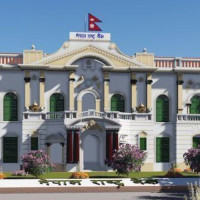
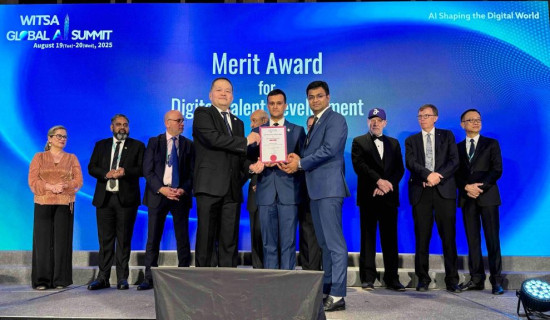
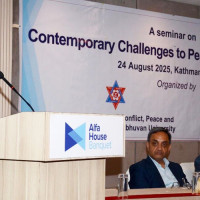
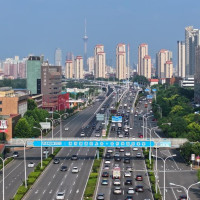
-original-thumb.jpg)







